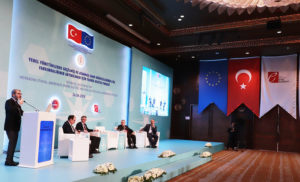
Implementation of the Priority Actions in Climate Change Sector
The Project’s overall objective is to achieve alignment of the North Macedonia’s legislation with the EU climate action legislation, and creation of an enabling environment for the successful implementation of the priority mitigation actions developed under the Long-term Strategy on Climate Action. The project’s specific objective is to

Supporting the Implementation of the Regional Waste Management Systems
The project aims are to support the North Macedonia in establishment of the regional waste management structure in the East and North-East Regions. To achieve its aims, the Project will be implemented through the following main activities: • Development and implementation of Regional Waste Management Public Awareness Program

Strengthening the Internal Market
Project is comprised of six components, as follows: Component 1: Improving the strategic, legislative and institutional framework in area of Free Movement of Goods Component 2: Improving the strategic, legislative and institutional framework in area of Free Movement of Services. Component 3: Improving the legislative alignment with the

Conducting Awareness Raising Activities and training / ToT sessions on “Zero Waste” in Şanlıurfa Haliliye and Kilis Center
The project’s overall objective is to support municipalities’ adaptation to the “Zero Waste Directive” and other applicable standards, norms, and legislations of the Turkish Ministry of Environment and Urbanization. This project aims to raise awareness and conduct training sessions on zero waste for refugees and their host communities.

Technical Assistance for Increasing Ethical Awareness Among Elected and Non-Elected Local Government Officials
The project aims to promote an ethical culture and minimize corrupt behaviour within the elected and non-elected local government officials during their service provisions. Within the frame of the project, WEglobal is helping to contribute efforts on embedding ethics and combatting corruption at local administrations under priorities set

Technical Assistance for Samsun Logistics Centre
The project was conceived, Turkey’s logistics network ranked 30th worldwide but offered much potential for improvement. With its strategic Black Sea location, seaports, airport and access to national rail and road networks, the Turkish city of Samsun was viewed as being in an excellent position to create a

